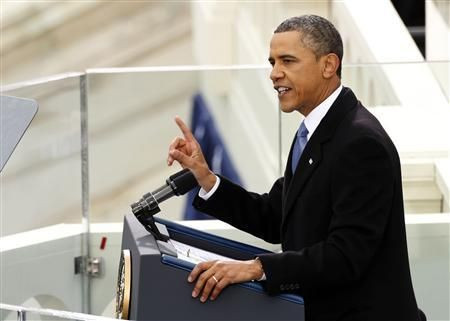Does America Know Its Own Best Interests?
Opinion

President Barack Obama raised eyebrows in Jewish circles recently when word leaked that, according to journalist Jeffrey Goldberg, he had been privately saying “Israel doesn’t know what its own best interests are.”
Obama’s comments, reflecting weariness more than anger about Israeli behavior, came when -- in response to a UN General Assembly vote in late November to grant Palestinians the status of “non-member observer state” -- Prime Minister Benjamin Netanyahu’s government announced it would build 3,000 more housing units in a controversial area of East Jerusalem and the West Bank.
Ironically, in the days since Obama’s second inaugural address, and in the weeks since the president began to assemble a new national security team for his second term, the question has increasingly begged itself about the United States: Does America itself know “what its own best interests are?”
We Americans are an insular people -- and the leaders we choose often channel our insularity. All too often, our leaders forget that while they’d like to speak only to their domestic audiences, they cannot realistically do so. Their words invariably send strong signals to the world’s far corners.
Already insular, we are increasingly turning inward. Our leaders are focused more on problems at home because they feel the anxieties of voters in a still-troubled economy, or because they doubt that America can accomplish much overseas anymore, or because they fear the unintended consequences of action.
But growing American inwardness comes at a strange and perilous time. Not only does the world demand our leadership, but opportunities abound for the U.S. to reassert itself in strikingly positive ways.
“My fellow Americans,” the president told some 800,000 people on the Washington Mall and tens of millions more at home, “we are made for this moment, and we will seize it -- so long as we seize it together.”
What the world sees, however, is that “this moment” is a domestic one, and that his agenda for the nation to seize is about revamping taxes, reforming schools, addressing climate change, and building a green economy.
What the world sees, as well, is a budget stand-off in Washington that seems increasingly likely to trigger deep cuts in military spending that could threaten America’s ability to play its traditional role on the world stage.
In his 15-minute oration, Obama devoted but three paragraphs (out of nearly 30) to foreign affairs. They included the usual platitudes about “our brave men and women in uniform” and the predictable vow to “defend our people and uphold our values through strength of arms and rule of law.” They included, as well, some welcome words about supporting democracy abroad for reasons of both morality and self-interest.
But the key foreign policy take-away, the sentence that surely attracted the most notice abroad, was this one:
“We will show the courage to try and resolve our differences with other nations peacefully -- not because we are naïve about the dangers we face, but because engagement can more durably lift suspicion and fear.”
Ah, “engagement” -- the longstanding cornerstone of Obama’s approach to the world, the doctrine of talking not just to friends but also to the bitterest of enemies “without preconditions,” the notion that dialogue will create new understandings that, in turn, will replace hostility with rapprochement.
When, alas, Obama speaks of “engagement,” our adversaries almost surely detect retrenchment, if not retreat.
For it was engagement that helped enable Iran make steady progress on the nuclear front and convinced Obama not to aggressively side with the millions of Iranians who crave a more democratic future.
It was engagement that prompted Obama to seek Russia’s help in convincing Syria’s Bashar al-Assad to stop his slaughter, rather than work with our allies on steps to defang al-Assad and build stronger ties to the rebels.
Now, it is hopes for more engagement that prevent Obama from speaking openly about a resurgent al-Qaeda, an increasingly emboldened radical Islam, and what can only be described as a “war on Christians” by radical Islamic forces in the Middle East, Central Asia, Africa, and elsewhere.
It is hopes for more engagement that prompted Obama to nominate, for Secretary of State and of Defense, two Vietnam veterans whose traumatic war-time experiences will make them exceptionally reluctant to use force abroad.
To be clear, talk is good and sometimes useful. But we must not confuse an exchange of views for a robust policy. The world is changing, with dangers mounting but opportunities abounding as well.
Yes, a rising China and a belligerent Russia are challenging the U.S. in ever-bolder ways. Yes, the Middle East remains a cauldron of simmering dangers, old and new. Yes, al-Qaeda is finding new venues for mayhem.
But, the U.S, finds itself with unexpectedly rising fortunes. It’s emerging from the Great Recession in better shape than many had expected, and it’s making progress in addressing its fiscal challenges.
It also finds itself the recipient of a home-grown energy revolution (built around its natural gas reserves) that could make it energy independent within a decade -- with all the geo-political advantages that would bring.
And, as democratic forces increasingly battle entrenched autocrats across the globe, America retains an enormous capacity to influence the outcomes.
This is no time for the United States to step back. It’s time for just the opposite.
Lawrence J. Haas, former communications director for Vice President Al Gore, is a senior fellow at the American Foreign Policy Council and author of “Sound the Trumpet: The United States and Human Rights Promotion.”
© Copyright IBTimes 2025. All rights reserved.





















